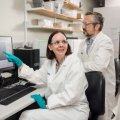While new drugs on the market are good news for rheumatoid arthritis sufferers, research at the University of Queensland could lead to improved use and effectiveness of current drugs.
Head of the School of Pharmacy and Australian Pharmacist of the Year (1999), Professor Sue Tett, is measuring blood concentrations of slow-acting disease modifying drugs in individual patients. Her research is trying to establish if age, sex, disease advancement and other factors determine the rate at which a person's body absorbs or eliminates the drugs.
"People react very differently to these drugs, yet the traditional form of treatment is to prescribe everyone the same dosage," she said. "By measuring blood concentrations after the drug has been taken, we can determine how a patient is likely to react. Through better ways of dosing, we hope to make better use of old drugs and produce better results for arthritis sufferers."
Professor Tett said the University research team was also working with staff at Princess Alexandra Hospital to examine blood concentrations in patients taking medication after liver transplantation.
New drugs on the market to treat the symptoms of rheumatoid arthritis have an added advantage - less side-effects.
According to Professor Tett, clinical trials of the drugs, cox-2 inhibitors, appear very positive.
"If a person who is now taking drugs to treat the symptoms of arthritis is not suffering side-effects, there is no reason to change to the new, more expensive drug. But for those who suffer side-effects such as peptic ulcers and gastric bleeding, this is a welcome development," she said.
Drugs currently available to treat the symptoms of arthritis inhibit all cyclo-oxygenase (cox) enzymes, however recent research has found that one of the enzymes actually offers protection to the patient. As a result, the new drugs are more specific in the inhibition of the other type of cyclo-oxygenase enzyme.
The University of Queensland was named Australian University of the Year in 1998 and is a recognised leader in medical and health-related research and teaching.
FOR FURTHER INFORMATION: Sue Tett telephone 3365 3191
.jpg)



